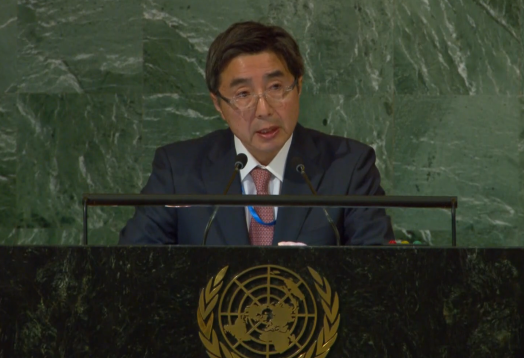安保理改革に係る国連総会討論における石兼大使ステートメント
令和4年11月17日

(as delivered)
Mr. President,
Japan aligns itself with the statement delivered by India on behalf of the G4. Please allow me to add some points in my national capacity.
Japan welcomes your determination, Mr. President, to advance the reform of the Security Council as expressed in your recent speech at the General Debate of the 77th session. In this context, we highly commend the early nominations of the Co-Chairs of the Intergovernmental Negotiations on Security Council Reform (IGN), Ambassador Michal Mlynár, Permanent Representative of the Slovak Republic, and Ambassador Tareq M. A. M. Albanai, Permanent Representative of the State of Kuwait. We look forward to your leadership, Mr. President, in guiding us towards concrete outcomes during this session. Please rest assured that you and the Co-Chairs will have Japan’s full support throughout the session.
Mr. President,
We stand at a historic watershed moment. The international order is being seriously challenged on many fronts, including by Russia’s aggression, and the Security Council’s credibility is in the gravest jeopardy since the Council’s creation. The Council must be at the center of our collective response to these challenges. The Council must function, guide, and facilitate meaningful discussions. It must be able to act with purpose. It must be trusted and looked up to. And, for that purpose, the Council needs to be reformed and strengthened.
Mr. President,
It is promising to see that there is renewed momentum for change. Around 70 Member States mentioned the necessity of Security Council reform during the High-level Week this year – that is almost double the number from last year. We are also encouraged to see that more permanent Council members are positive toward reform.
Japan welcomes all initiatives to limit the use of the veto, including by the ACT Group, France, Mexico and the United States, and we would like to continue to deepen discussions with Member States on this issue.
Mr. President,
When we conduct negotiations, we need a text to negotiate on. Clear and simple. There is no other way to ensure meaningful progress. The existing IGN Co-Chairs Elements Paper can be the basis for such a text. I am glad to hear many speakers today, regardless of their positions, agree on the importance of the Paper. The Paper should be updated after each meeting by introducing attribution to record the positions of each Member State and group. Such a document would also serve as a record of the positions and proposals of Member States and groups, which in turn would make it easier for the wider membership to actively participate in the IGN.
Mr. President,
In order to avoid the repetition of the same old discussion, I will note that you, together with the Co-Chairs, are fully empowered to set the goal of this IGN session before it begins early next year. I trust you will do so.
In the past IGN meetings, we were lost. We did not know the goal - where we were heading. We would start the IGN in February, hold 5 or 6 meetings based on the speakers list, and conclude in June by adopting the same old roll-over decisions.
I believe the majority of Member States here will welcome it if you set the objective of this IGN session in the coming weeks. An objective, such as adopting a text on which we can work into the following sessions and make progress. The text can be based on the Co-Chairs Elements Paper, as we have suggested, or on some other basis. Once a goal is set, we should engage with each other seriously to achieve it. We can have as many IGN meetings as required for that purpose.
Let me stress once again, Mr. President, that you are fully authorized to do this. We elected you unanimously to advance the agenda items of the General Assembly including Security Council reform.
Mr. President,
We need concrete action now. It is high time we move to text-based negotiations. We look forward to constructive and productive negotiations under your leadership, and facilitation by the Co-Chairs.
Before I conclude, it is regrettable that a Member state made a groundless statement regarding Japan.
I thank you.
